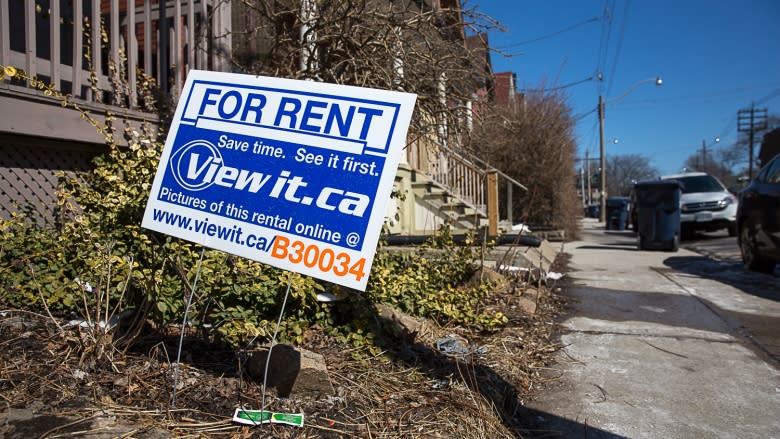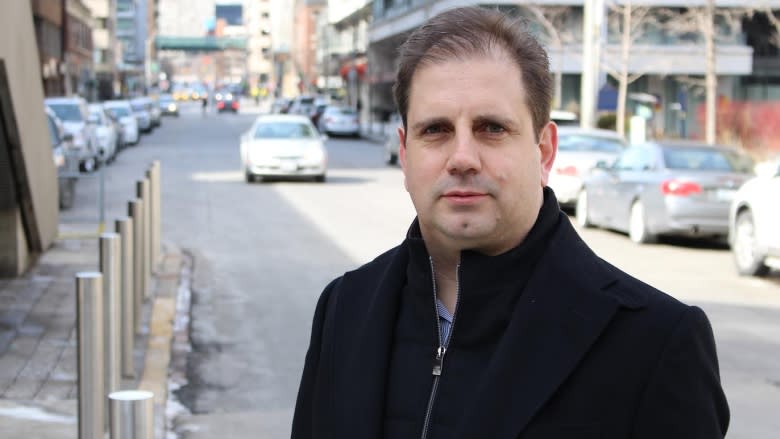Expand it, tweak it, or end it — what's the right answer for rent control?
Amid low vacancy rates and a growing push for more rental stock, Ontario's housing minister says the province will soon unveil new "rental controls."
But what should a reimagined rent control system look like?
Various experts and stakeholders — from landlords to economists to tenant advocates — have different takes, with some hoping for expanded rent control, and others calling for it to end entirely.
The conversation follows last week's comments from Minister Chris Ballard, who told CBC Toronto it's "absolutely unacceptable" how much pressure renters are facing in today's rental market, and says the province will be bringing forward legislation that expands on the rent controls currently in place.
His promise came shortly after NDP MPP Peter Tabuns said he would table a private member's bill that calls for an end to the so-called "1991 loophole," which exempts property built after Nov. 1, 1991 from provincial rent control.
Properties built before that time can only increase the rent once every year by Ontario's annual increase guideline, which is 1.5 per cent for 2017.
Closing the "loophole" and ending what many see as a two-tier system is a top priority for some stakeholders, including tenant advocacy groups ACORN and the Federation of Metro Tenants' Associations.
There's no reason for it, other than "phasing out rent control gradually," says FMTA executive director Geordie Dent, who argues rent control enforces minimum standards and rights for tenants.
Former premier Mike Harris's Tory government made the law in 1997, saying it would spark developers to create more rental apartments — but tenant advocates now say it didn't spur nearly enough development.
Ditching vacancy decontrol should be priority, some say
Dent says the "loophole" isn't the only thing that has to change.
The FMTA is also pushing the province to ditch regulations known in Ontario as "vacancy decontrol," which regulate the raising of rent and allow landlords to set rent increases between tenants.
Those increases would then take effect when a new tenant signs a lease.
"Once you have vacancy decontrol, it's a hot market that determines what the landlord will try to charge… Markets are supply and demand, and we have only demand and almost no supply," said David Hulchanski, a professor of housing and community development at the University of Toronto who also supports scrapping vacancy decontrol.
The impact of vacancy decontrol is something housing advocate Elinor Mahoney explored in a 2001 Journal of Law and Social Policy article. That year, the going rate for a modest one-bedroom apartment in an older downtown building was between $950 and $1150 without parking.
"In 1997, before vacancy decontrol, these units rented for as little as $600.23," Mahoney wrote.
Now, the average rent for a one-bedroom condo apartment in Toronto is around $1,800, according to a Toronto Real Estate Board analysis.
Getting rid of vacancy decontrol would prevent landlords from "jacking the rent for a new tenant to whatever they want," says Dent.
"If we had had rent control over the last five years, we wouldn't have seen the level of rent escalation we're going through right now," he says.
'It's hard to justify rent control'
Realtor Thomas Mirkovich takes a different stance: He says the province should either keep the status quo, or end rent control completely.
The 1.5 per cent increase allowed in 2017 for pre-1991 buildings is out of line with rising real estate prices, Mirkovich notes.
"There's a real disconnect," he said. "Real estate is a market driven industry and it's hard to justify rent control."
Condo fees and property management fees are also outpacing allowed rent increases, notes landlord advocate Kayla Andrade. She doesn't go so far as to suggest scrapping rent control entirely, but says guidelines should factor in the expenses landlords face, like rising hydro fees, which can vary between properties.
"We need to try to recover that cost within the rent," Andrade says.
From an economic perspective, University of Toronto assistant professor Jonathan Hall says whatever changes come down the pipe for rent control in Ontario, they'll need to balance providing affordable housing, avoiding corruption and discrimination, and minimizing disruption within communities.
He says a "perfect" system might involve having rent control across the board — but only allow it to last for, say, seven to 10 years so that a certain monthly rent isn't locked in indefinitely for landlords.
One big question remains: What kinds of tweaks to the legislation are actually doable?
For stakeholders hoping for change, now it's a waiting game to see what the province comes up with. Ballard couldn't commit as to when the changes to the Residential Tenancy Act could be tabled in the legislature, but says he's pushing his staff to have it ready shortly.
No Fixed Address
CBC Toronto has been sharing your experiences for our ongoing series on renting in Toronto. Check out our Facebook group or some of our previous stories.





